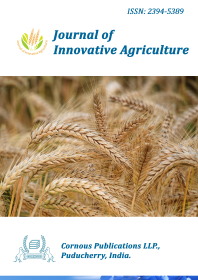
Journal of Innovative Agriculture
Peer Reviewed Open Access Journal
ISSN: 2394-5389 NAAS Rate: 4.05
Submit Manuscript
Peer Reviewed Open Access Journal
ISSN: 2394-5389 NAAS Rate: 4.05
Submit ManuscriptThis study investigates the status of tea consumption in the study area. Random sampling technique was used to select Oyo and Ogun States from the Southwestern part of Nigeria where the study was carried out. Three Local Government Areas (LGAs) were randomly selected from the two States while a total of 120 tea consumers were randomly selected from the two States for the study. The information collected from the consumers was analysed using descriptive statistics and multivariate regression model. The result of the analysis shows that tea is consumed mostly by the respondents with the age bracket 31-40 years while consumers who are members of one association or the other consume more tea than those that are non-members. Furthermore, 91.7% of the respondents consume tea showing that tea is widely consumed in the study area and majority (85.8%) of the consumers consumed lipton tea. Majority (72.5%) of the consumers submitted that they consume tea because it is good for their health while 14.2% of the consumers claimed that they consume tea as a stimulant. The factors that significantly determine the quantity of tea consumption in the study area are age of consumer, gender of consumer, household size, frequency of tea consumption, tea purchasing point and the purpose of tea consumption. The study recommended that tea consumers should be sensitized on the need to consume tea on daily basis.
Status, tea, consumption, stimulant, consumers, descriptive
Aina, L.O. (2006). Information provision to farmers in Africa: The library – extension service linkage World library and Information Council, Seoul, Korea.
Aroyeun, S.O., T.R. Shittu, A.T. Yahaya, F.A. Sowunmi, L.A.Odumbaku, F.A. Okelana and M.O. Akoroda. 2013. Green Tea Processing in Nigeria and its Economic Implications. Global Advanced Research Journal of Management and Business Studies, 2(1): 050-055.
Chopra, D. and S. David. 2002. The Chopra centre herbal Handbook. Three Rivers Press U.S.A. 250–331.
Costa, L.M., S.T. Gouveia, and J.A. Nobrega. 2002. Comparison of heating extraction procedures for Al, Ca, Mg, and Mn in Tea samples. 2002. Ann sci. 313–318.
Ekong, E.E. 2003. An Introduction to Rural Sociology (2nd ed.) Uyo: Dove Educational publishers. 2003. FAO (2006) Annual report (Nigeria). Rome.
Geng, Z.Y., B.Y. Tao, and X. Li. 1998. Effect of green tea and black tea in blood glucose, triglycerides and anti-oxidants in aged rats. J. Agric. Food Chem., 46 (10): 3875-3878.
Hudson, S. and N. Tabet. 2003. Acetyl-carnitine for dementia (coherane Review) Cochrane Database Syst. c D003158.
Kursat, D., E. Huseyi, C. Vedat, A. Savas, and U. Osman. 2008. Agricultural information systems and communication net work: the case of dairy farmers in the Samsun province of Turkey – Information Research (IR). 13(2): 1-25.
Ody, P. 1993. Paper 4:68–89 Revealed Complete Medical herbal. Dorling Kindersley ltd. London.
Oluyole, K.A. 2010. Food security status among cocoa farming households in Ondo State. An unpublished MPhil Dissertation of the Department of Agricultural Economics, University of Ibadan, Ibadan. Nigeria.
Oluyole, K.A., M.A. Daniel and A.T. Yahaya. 2015. Land Use and Its Effects on the Income of Tea Farmers on Mambilla Plateau in Taraba State, Nigeria. Journal of Basic and Applied Research International, 4(3): 122-125.
Sowunmi, F.A., S.O. Aroyeun, V.O. Okoruwa and M.O. Biobaku. 2009. Tea consumption in Ogun State, Nigeria: Prevalence and Characteristics of Consumers. Current Research Journal of Social Science, 1 (1): 24-30.
Stephanou, A. 2004. Green tea lowers blood pressure and helps prevent Hypertension. Journal of cellular and molecular medicine, 4:239-44.
Thomas, P. 1991. Is Caffeine Bad for you? In: The world Book Health and Medical Annual World Book Incorporated. Chicago. 11-25.
